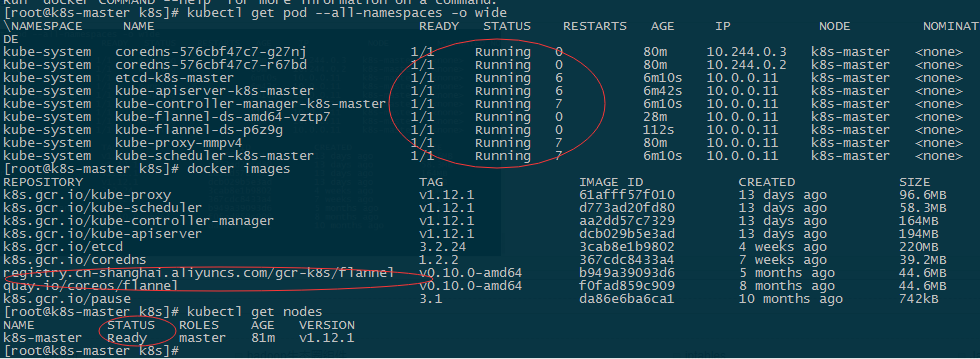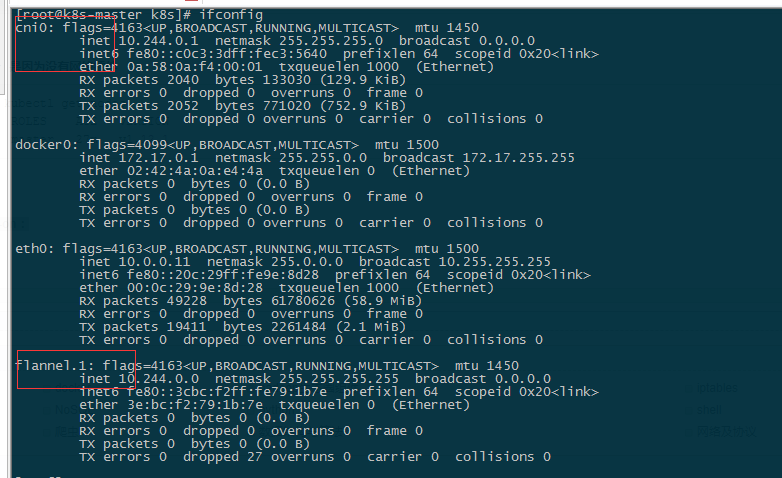使用kubeadm安装kubernetes1.12.1
kubeadm是kubernetes官方用来自动化高效安装kubernetes的工具,手动安装,特别麻烦。
使用kubeadm安装无疑是一种不错的选择。
1、环境准备
1.1系统配置
系统是CentOS Linux release 7.5
[root@k8s-master ~]# tail -3 /etc/hosts 10.0.0.11 k8s-master 10.0.0.12 k8s-node1
10.0.0.13 k8s-node3
禁用防火墙和selinux
添加内核参数文件 /etc/sysctl.d/k8s.conf
net.bridge.bridge-nf-call-ip6tables = 1 net.bridge.bridge-nf-call-iptables = 1 net.ipv4.ip_forward = 1
vm.swappiness = 0
执行命令使修改生效
modprobe br_netfilter sysctl -p /etc/sysctl.d/k8s.conf
1.2安装Docker(所有节点)
yum install -y yum-utils device-mapper-persistent-data lvm2
wget https://mirrors.aliyun.com/docker-ce/linux/centos/docker-ce.repo -O /etc/yum.repos.d/docker.repo
查看可下载的版本
[root@k8s-master ~]# yum list docker-ce.x86_64 --showduplicates |sort -r Repository base is listed more than once in the configuration Repository updates is listed more than once in the configuration Repository extras is listed more than once in the configuration Repository centosplus is listed more than once in the configuration * updates: mirrors.nju.edu.cn Loading mirror speeds from cached hostfile Loaded plugins: fastestmirror, langpacks * extras: mirrors.njupt.edu.cn * epel: mirror01.idc.hinet.net docker-ce.x86_64 18.06.1.ce-3.el7 docker-ce-stable docker-ce.x86_64 18.06.0.ce-3.el7 docker-ce-stable docker-ce.x86_64 18.03.1.ce-1.el7.centos docker-ce-stable docker-ce.x86_64 18.03.0.ce-1.el7.centos docker-ce-stable docker-ce.x86_64 17.12.1.ce-1.el7.centos docker-ce-stable docker-ce.x86_64 17.12.0.ce-1.el7.centos docker-ce-stable docker-ce.x86_64 17.09.1.ce-1.el7.centos docker-ce-stable docker-ce.x86_64 17.09.0.ce-1.el7.centos docker-ce-stable docker-ce.x86_64 17.06.2.ce-1.el7.centos docker-ce-stable docker-ce.x86_64 17.06.1.ce-1.el7.centos docker-ce-stable docker-ce.x86_64 17.06.0.ce-1.el7.centos docker-ce-stable docker-ce.x86_64 17.03.3.ce-1.el7 docker-ce-stable docker-ce.x86_64 17.03.2.ce-1.el7.centos docker-ce-stable docker-ce.x86_64 17.03.1.ce-1.el7.centos docker-ce-stable docker-ce.x86_64 17.03.0.ce-1.el7.centos docker-ce-stable
# yum makecache fast
# yum install docker-ce -y
[root@k8s-node1 ~]# docker -v Docker version 18.06.1-ce, build e68fc7a
[root@k8s-node1 ~]# systemctl start docker ;systemctl enable docker
2.使用kubeadm部署Kubernetes
2.1安装kubelet 和 kubeadm
生成kubernetes的yum仓库配置文件/etc/yum.repos.d/kubernetes.repo,内容如下:
[kubernetes] name=Kubernetes baseurl=https://mirrors.aliyun.com/kubernetes/yum/repos/kubernetes-el7-x86_64/ gpgcheck=0 gpgkey=https://mirrors.aliyun.com/kubernetes/yum/doc/rpm-package-key.gpg enabled=1
yum makecache fast yum install -y kubelet kubeadm kubectl
关闭swap功能
[root@k8s-node1 yum.repos.d]# swapoff -a [root@k8s-node1 yum.repos.d]# sysctl -p /etc/sysctl.d/k8s.conf
注释掉 、/etc/fstab 中swap的条目

mount -a
echo "KUBELET_EXTRA_ARGS=--fail-swap-on=false" > /etc/sysconfig/kubelet
2.2 使用kubeadm init初始化集群
在各节点开机启动kubelet服务:
systemctl enable kubelet.service
使用kubeadm初始化集群,会发生一下错误,这是由于初始化时,先从本地查找 有没有kubenetes组件的相关镜像如果找不到就从谷歌镜像站下载,如果你不FQ就只能让本地存在这些镜像。
我们可以从docker镜像站下载kubernetes相关组件的镜像然后给他重新打tag
[root@k8s-master yum.repos.d]# kubeadm init --kubernetes-version=v1.12.1 --pod-network-cidr=10.244.0.0/16 --apiserver-advertise-address=10.0.0.11
[init] using Kubernetes version: v1.12.1
[preflight] running pre-flight checks
[WARNING Service-Docker]: docker service is not enabled, please run 'systemctl enable docker.service'
[preflight/images] Pulling images required for setting up a Kubernetes cluster
[preflight/images] This might take a minute or two, depending on the speed of your internet connection
[preflight/images] You can also perform this action in beforehand using 'kubeadm config images pull'
[preflight] Some fatal errors occurred:
[ERROR ImagePull]: failed to pull image k8s.gcr.io/kube-apiserver:v1.12.1: output: Error response from daemon: Get https://k8s.gcr.io/v2/: EOF
, error: exit status 1
[ERROR ImagePull]: failed to pull image k8s.gcr.io/kube-controller-manager:v1.12.1: output: Error response from daemon: Get https://k8s.gcr.io/v2/: EOF
, error: exit status 1
[ERROR ImagePull]: failed to pull image k8s.gcr.io/kube-scheduler:v1.12.1: output: Error response from daemon: Get https://k8s.gcr.io/v2/: EOF
, error: exit status 1
[ERROR ImagePull]: failed to pull image k8s.gcr.io/kube-proxy:v1.12.1: output: Error response from daemon: Get https://k8s.gcr.io/v2/: EOF
, error: exit status 1
[ERROR ImagePull]: failed to pull image k8s.gcr.io/pause:3.1: output: Error response from daemon: Get https://k8s.gcr.io/v2/: EOF
, error: exit status 1
[ERROR ImagePull]: failed to pull image k8s.gcr.io/etcd:3.2.24: output: Error response from daemon: Get https://k8s.gcr.io/v2/: EOF
, error: exit status 1
[ERROR ImagePull]: failed to pull image k8s.gcr.io/coredns:1.2.2: output: Error response from daemon: Get https://k8s.gcr.io/v2/: EOF
, error: exit status 1
[preflight] If you know what you are doing, you can make a check non-fatal with `--ignore-preflight-errors=...`
执行脚本
[root@k8s-master ~]# cat k8s.sh docker pull mirrorgooglecontainers/kube-apiserver:v1.12.1 docker pull mirrorgooglecontainers/kube-controller-manager:v1.12.1 docker pull mirrorgooglecontainers/kube-scheduler:v1.12.1 docker pull mirrorgooglecontainers/kube-proxy:v1.12.1 docker pull mirrorgooglecontainers/pause:3.1 docker pull mirrorgooglecontainers/etcd:3.2.24 docker pull coredns/coredns:1.2.2 docker tag mirrorgooglecontainers/kube-proxy:v1.12.1 k8s.gcr.io/kube-proxy:v1.12.1 docker tag mirrorgooglecontainers/kube-scheduler:v1.12.1 k8s.gcr.io/kube-scheduler:v1.12.1 docker tag mirrorgooglecontainers/kube-apiserver:v1.12.1 k8s.gcr.io/kube-apiserver:v1.12.1 docker tag mirrorgooglecontainers/kube-controller-manager:v1.12.1 k8s.gcr.io/kube-controller-manager:v1.12.1 docker tag mirrorgooglecontainers/etcd:3.2.24 k8s.gcr.io/etcd:3.2.24 docker tag coredns/coredns:1.2.2 k8s.gcr.io/coredns:1.2.2 docker tag mirrorgooglecontainers/pause:3.1 k8s.gcr.io/pause:3.1 docker rmi mirrorgooglecontainers/kube-apiserver:v1.12.1 docker rmi mirrorgooglecontainers/kube-controller-manager:v1.12.1 docker rmi mirrorgooglecontainers/kube-scheduler:v1.12.1 docker rmi mirrorgooglecontainers/kube-proxy:v1.12.1 docker rmi mirrorgooglecontainers/pause:3.1 docker rmi mirrorgooglecontainers/etcd:3.2.24 docker rmi coredns/coredns:1.2.2
bash k8s.sh
[root@k8s-master ~]# docker images REPOSITORY TAG IMAGE ID CREATED SIZE k8s.gcr.io/kube-proxy v1.12.1 61afff57f010 11 days ago 96.6MB k8s.gcr.io/kube-apiserver v1.12.1 dcb029b5e3ad 11 days ago 194MB k8s.gcr.io/kube-controller-manager v1.12.1 aa2dd57c7329 11 days ago 164MB k8s.gcr.io/kube-scheduler v1.12.1 d773ad20fd80 11 days ago 58.3MB k8s.gcr.io/etcd 3.2.24 3cab8e1b9802 3 weeks ago 220MB k8s.gcr.io/coredns 1.2.2 367cdc8433a4 6 weeks ago 39.2MB k8s.gcr.io/pause 3.1 da86e6ba6ca1 10 months ago 742kB
具体操作如下:
查看kubernetes的版本
[root@k8s-master yum.repos.d]# kubeadm version kubeadm version: &version.Info{Major:"1", Minor:"12", GitVersion:"v1.12.1", GitCommit:"4ed3216f3ec431b140b1d899130a69fc671678f4", GitTreeState:"clean", BuildDate:"2018-10-05T16:43:08Z", GoVersion:"go1.10.4", Compiler:"gc", Platform:"linux/amd64"}
再次在master节点上执行初始化
kubeadm init --kubernetes-version=v1.12.1 --pod-network-cidr=10.244.0.0/16 --apiserver-advertise-address=10.0.0.11
输出信息如下:
[root@k8s-master ~]# kubeadm init --kubernetes-version=v1.12.1 --pod-network-cidr=10.244.0.0/16 --apiserver-advertise-address=10.0.0.11 [init] using Kubernetes version: v1.12.1 [preflight] running pre-flight checks [preflight/images] Pulling images required for setting up a Kubernetes cluster [preflight/images] This might take a minute or two, depending on the speed of your internet connection [preflight/images] You can also perform this action in beforehand using 'kubeadm config images pull' [kubelet] Writing kubelet environment file with flags to file "/var/lib/kubelet/kubeadm-flags.env" [kubelet] Writing kubelet configuration to file "/var/lib/kubelet/config.yaml" [preflight] Activating the kubelet service [certificates] Using the existing apiserver-etcd-client certificate and key. [certificates] Using the existing etcd/server certificate and key. [certificates] Using the existing etcd/healthcheck-client certificate and key. [certificates] Using the existing etcd/peer certificate and key. [certificates] Using the existing apiserver certificate and key. [certificates] Using the existing apiserver-kubelet-client certificate and key. [certificates] Using the existing front-proxy-client certificate and key. [certificates] valid certificates and keys now exist in "/etc/kubernetes/pki" [certificates] Using the existing sa key. [kubeconfig] Using existing up-to-date KubeConfig file: "/etc/kubernetes/admin.conf" [kubeconfig] Using existing up-to-date KubeConfig file: "/etc/kubernetes/kubelet.conf" [kubeconfig] Using existing up-to-date KubeConfig file: "/etc/kubernetes/controller-manager.conf" [kubeconfig] Using existing up-to-date KubeConfig file: "/etc/kubernetes/scheduler.conf" [controlplane] wrote Static Pod manifest for component kube-apiserver to "/etc/kubernetes/manifests/kube-apiserver.yaml" [controlplane] wrote Static Pod manifest for component kube-controller-manager to "/etc/kubernetes/manifests/kube-controller-manager.yaml" [controlplane] wrote Static Pod manifest for component kube-scheduler to "/etc/kubernetes/manifests/kube-scheduler.yaml" [etcd] Wrote Static Pod manifest for a local etcd instance to "/etc/kubernetes/manifests/etcd.yaml" [init] waiting for the kubelet to boot up the control plane as Static Pods from directory "/etc/kubernetes/manifests" [init] this might take a minute or longer if the control plane images have to be pulled [apiclient] All control plane components are healthy after 18.503179 seconds [uploadconfig] storing the configuration used in ConfigMap "kubeadm-config" in the "kube-system" Namespace [kubelet] Creating a ConfigMap "kubelet-config-1.12" in namespace kube-system with the configuration for the kubelets in the cluster [markmaster] Marking the node k8s-master as master by adding the label "node-role.kubernetes.io/master=''" [markmaster] Marking the node k8s-master as master by adding the taints [node-role.kubernetes.io/master:NoSchedule] [patchnode] Uploading the CRI Socket information "/var/run/dockershim.sock" to the Node API object "k8s-master" as an annotation [bootstraptoken] using token: o3ha14.vdjveh35zz0coqzz [bootstraptoken] configured RBAC rules to allow Node Bootstrap tokens to post CSRs in order for nodes to get long term certificate credentials [bootstraptoken] configured RBAC rules to allow the csrapprover controller automatically approve CSRs from a Node Bootstrap Token [bootstraptoken] configured RBAC rules to allow certificate rotation for all node client certificates in the cluster [bootstraptoken] creating the "cluster-info" ConfigMap in the "kube-public" namespace [addons] Applied essential addon: CoreDNS [addons] Applied essential addon: kube-proxy Your Kubernetes master has initialized successfully! To start using your cluster, you need to run the following as a regular user: mkdir -p $HOME/.kube sudo cp -i /etc/kubernetes/admin.conf $HOME/.kube/config sudo chown $(id -u):$(id -g) $HOME/.kube/config You should now deploy a pod network to the cluster. Run "kubectl apply -f [podnetwork].yaml" with one of the options listed at: https://kubernetes.io/docs/concepts/cluster-administration/addons/ You can now join any number of machines by running the following on each node as root: kubeadm join 10.0.0.11:6443 --token o3ha14.vdjveh35zz0coqzz --discovery-token-ca-cert-hash sha256:334ee25422b82ba08a5f4341e1b65f23abf2fdd486a0f471cf3ad0824b258e13
按照上面输出提示进行操作
[root@k8s-master ~]# mkdir -p $HOME/.kube [root@k8s-master ~]# sudo cp -i /etc/kubernetes/admin.conf $HOME/.kube/config [root@k8s-master ~]# sudo chown $(id -u):$(id -g) $HOME/.kube/config
mkdir -p ~/k8s/ && cd ~/k8s
[root@k8s-master k8s]# wget https://raw.githubusercontent.com/coreos/flannel/master/Documentation/kube-flannel.yml
#这里改成自己的网卡
# vim kube-flannel.yml args: - --ip-masq - --kube-subnet-mgr - --iface=eth0 # kubectl apply -f kube-flannel.yml
查看集群状态

集群初始化如果遇到问题,可以使用下面的命令进行清理:
kubeadm reset ifconfig cni0 down ip link delete cni0 ifconfig flannel.1 down ip link delete flannel.1 rm -rf /var/lib/cni/
2.3 安装Pod Network
#这时master状态为notready 是因为没有网络插件
[root@k8s-master k8s]# kubectl get nodes NAME STATUS ROLES AGE VERSION k8s-master NotReady master 27m v1.12.1
接下来安装flannel network add-on:
获取组件健康状态
[root@k8s-master k8s]# kubectl get cs NAME STATUS MESSAGE ERROR scheduler Healthy ok controller-manager Healthy ok etcd-0 Healthy {"health": "true"}
[root@k8s-master k8s]# kubectl describe node k8s-master Name: k8s-master Roles: master Labels: beta.kubernetes.io/arch=amd64 beta.kubernetes.io/os=linux kubernetes.io/hostname=k8s-master node-role.kubernetes.io/master= Annotations: kubeadm.alpha.kubernetes.io/cri-socket: /var/run/dockershim.sock node.alpha.kubernetes.io/ttl: 0 volumes.kubernetes.io/controller-managed-attach-detach: true CreationTimestamp: Wed, 17 Oct 2018 21:24:01 +0800 Taints: node-role.kubernetes.io/master:NoSchedule node.kubernetes.io/not-ready:NoSchedule Unschedulable: false


上面输出显示首先会下载一个flannel镜像,namespace全部为running状态, master为ready
2.4master参与工作负载
出于安全考虑Pod不会被调度到Master Node上,也就是说Master Node不参与工作负载。这是因为当前的master节点node1被打上了node-role.kubernetes.io/master:NoSchedule的污点:
[root@k8s-master k8s]# kubectl describe node k8s-master | grep Taint Taints: node-role.kubernetes.io/master:NoSchedule
# 如果需要改回来不想让master节点参与到工作负载
kubectl taint node k8s-master node-role.kubernetes.io/master="":NoSchedule
去除污点使k8s-master参与负载
[root@k8s-master k8s]# kubectl taint nodes k8s-master node-role.kubernetes.io/master-
node/k8s-master untainted
[root@k8s-master k8s]# kubectl describe node k8s-master | grep Taint
Taints: <none>
2.5测试DNS
kubectl run curl --image=radial/busyboxplus:curl -it


2.6 向Kubernetes集群中添加Node节点
下面我们将node1 node2这个主机添加到Kubernetes集群中, 在node1和node2上执行:
[root@k8s-node1 ~]# kubeadm join 10.0.0.11:6443 --token i4us8x.pw2f3botcnipng8e --discovery-token-ca-cert-hash sha256:d16ac747c2312ae829aa29a3596f733f920ca3d372d9f1b34d33c938be067e51

查看节点,

原因是节点k8-node1也要获取镜像,执行以上的获取镜像的脚本即可,两个节点分别重置集群,kubeadm reset,然后重新初始化。

从master节点如果需要移出这个node1节点
在master节点上执行:
kubectl drain k8s-node1 --delete-local-data --force --ignore-daemonsets
kubectl delete node k8s-node1



 浙公网安备 33010602011771号
浙公网安备 33010602011771号